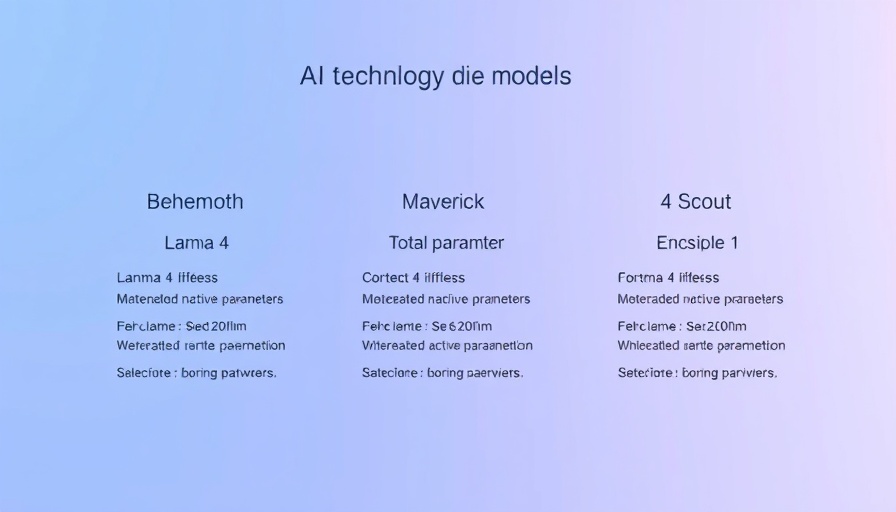
Meta's Llama 4 AI Models Under Scrutiny
Meta, the tech giant known for its proactive ventures in artificial intelligence (AI), finds itself facing accusations regarding the manipulation of its latest AI models, Llama 4 Maverick and Llama 4 Scout. A recently surfaced rumor on social media sparked controversy, with critics suggesting that Meta employed ‘test sets’ during the training phase of these models, giving them an unfair edge in performance assessments.
Understanding Test Sets and Training Fairness
In the AI development world, test sets serve as crucial evaluation tools, much like a final exam for students. They are designed to gauge an AI model's performance after training is complete, not during the training phase. Using test sets prematurely could misrepresent an AI's true capabilities, akin to allowing a student to review exam questions beforehand.
The argument gained traction when a purported former Meta employee took to Chinese social media to assert they left the company due to unethical practices. Although these claims are serious, it’s essential to discern fact from speculation.
The Discrepancy in Performance: Reality vs. Expectation
As users began to compare results, many noticed a disparity in how the Llama 4 models functioned in real-world tasks compared to their performance on benchmarks, such as the one provided by LM Arena. Key differences arose between the public-facing Maverick model and the unreleased version used in benchmark testing, deepening concerns.
However, Meta's senior executive, Ahmad Al-Dahle, responded emphatically to these accusations. He asserted that the claims of manipulation are utterly false, explaining that the company’s rush to release these models has led to varying performance outcomes across platforms as not all versions are optimized.
Current Challenges and Solutions in AI Development
Despite the backlash, Al-Dahle is optimistic about the technology. He mentioned that while Meta is hearing of mixed results from users, these discrepancies are primarily due to ongoing technical adjustments, rather than any deceptive practices. The team is actively working to resolve these inconsistencies and enhance the functionality of Llama 4 models for all users.
This commitment reflects a broader trend in the AI landscape, where rapid innovation frequently faces scrutiny. Tech companies, including Meta, must balance the need for speed in releasing cutting-edge tools with the responsibility of ensuring accuracy and reliability.
Real-World Applications of Llama 4 AI Models
The Llama 4 series is intended to bolster various industries, enhancing capabilities in areas ranging from content creation to customer service. As AI technology evolves, so too do the opportunities for entrepreneurs and professionals to leverage these advancements.
For instance, creators can utilize Llama 4 to enrich their content generation processes, while professionals may find applications in automating routine tasks or enhancing client interactions. Awareness of potential pitfalls like the ones arising from performance discrepancies can empower users to adapt and innovate further.
The Future of AI Trust and Transparency
As the debate over AI model integrity continues, it underscores the importance of transparency in the tech industry. Users must trust the performance claims made by companies, especially when they invest in tools that promise to streamline workflows and improve outcomes.
This situation with Meta serves as a critical reminder for entrepreneurs to remain skeptical, routinely evaluate their tools, and stay informed about the latest trends and technologies in AI. Keeping a pulse on developments will better position them to leverage AI responsibly and effectively.
Your Role in the AI Revolution
The rise of AI tools like Llama 4 presents both opportunities and challenges. For businesses looking to innovate, understanding the intricacies of AI performance metrics can deliver a substantial competitive edge. Whether you're a professional curator of digital content or an entrepreneur seeking new efficiencies, staying informed about these issues is crucial. Meta's claims, whether validated or not, illustrate the dynamic interplay between innovation, ethics, and market readiness.
As you consider integrating AI technologies into your operations, remember to engage with resources that provide updates on AI news summaries, weekly AI roundups, and insights on latest AI trends for 2025. This knowledge will be invaluable as you navigate the evolving landscape.
 Add Row
Add Row  Add
Add 




 Add Row
Add Row  Add
Add 

Write A Comment